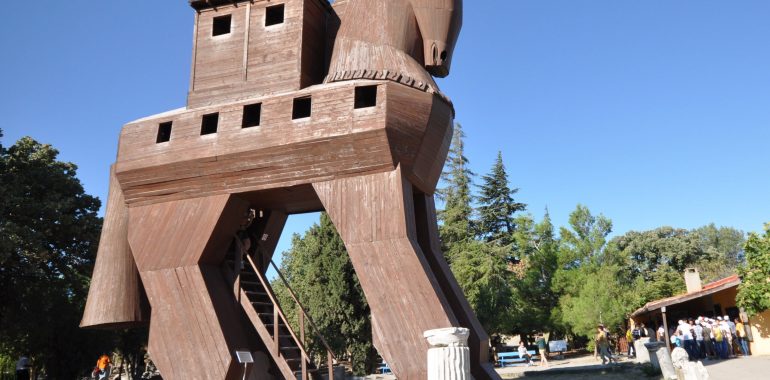From Hittite Songs to Egyptian Coffee: Debunking April Fools’ Viral Myths

From Hittite Songs to Egyptian Coffee: Debunking April Fools’ Viral Myths
On April 1, 2025 several false historical claims were circulating the internet as part of April Fools’ Day. One of them in particular was very widely circulated and deceived many readers. Did you fall for these April Fools’ jokes? Read this article to make sure you haven’t been tricked.
A Hittite song about the Trojan War
The April Fool’s joke which proved particularly popular was the claim that archaeologists found an ancient Hittite tablet. Supposedly, this tablet contains a record of an attack on the city of Taruisa. From other tablets which are genuinely historical, we know that this was a real place name that was associated with Wilusa, or ancient Ilion. This was another name for Troy.
This ‘new’ tablet explains that Taruisa was attacked by the sons of Attarsiya from the land of Ahhiyawa. Most historians agree that the Ahhiyawa of Hittite records were the Mycenaean Greeks.
The document is a letter addressed to a certain Pariyamuwa, implied to be the king of the city. The sender mentions that he, from Lukka, sent troops to Pariyamuwa. He notes that the king had not responded to him, and he asks what has happened to Crown Prince Alaksandu.
The unidentified sender then mentions that “they sing in Luwian of the destruction of steep Wilusa.” In other words, Troy had fallen and songs were being written about it.
It is obvious that this is supposed to be about the Trojan War from the Iliad. Attarsiya was a real war leader in the Bronze Age who some researchers have attempted to identify as Atreus. His sons, mentioned in this fake tablet, are obviously supposed to be Agamemnon and Menelaus.
Pariyamuwa, the implied king of Taruisa or Wilusa, is obviously Priam. The reference to Crown Prince Alaksandu is a hint at Paris Alexander. If such a document were genuine, it would essentially prove that the Iliad is fundamentally historical. However, this is confirmed to be an April Fool’s joke. In fact, it was originally circulated last year.
Egyptian coffee
A much more obvious April Fool’s joke appeared on Instagram. The post in question reads:
“A groundbreaking discovery in Egypt! Archaeologists have just uncovered a new set of ancient hieroglyphs, and this time . . . the theme is COFFEE!
Experts are stunned: the hieroglyphs reveal that over 3,000 years ago, the Egyptians seem to have celebrated the world’s most beloved drink!
The mystery remains: was it a cappuccino or an espresso that was their ancient favorite?”
While the final line is obviously a joke, one could be fooled into thinking that the supposed discovery is genuine. If so, it would fundamentally change our understanding of the history of coffee. After all, its accepted origins today only go back about 1000 years at most.
If archaeologists really did discover proof that people were drinking coffee as far back as 3000 years ago, this would be remarkable indeed. On the other hand, coffee originated from Ethiopia. This is just south of Egypt. Therefore, on a geographical basis, this supposed discovery is not too implausible.
However, the Instagram post was accompanied by an image which made it abundantly clear that it was simply a joke. The image showed supposed hieroglyphs of modern coffee mugs and take-away coffee cups, as well as kettles and other modern equipment.
To remove any doubt, the supposed ancient relief also contained the words ‘Dalla Corte’ near the bottom. This is an Italian company that makes espresso machines. It is also the company whose Instagram page made the post.
Emperor Charles IV’s well-being routine
A slightly more subtle April Fool’s joke was posted by Charles University Magazine on the Forum website. The title reads: “Wellbeing was already a priority for King Charles IV.”
Charles IV was emperor of the Holy Roman Empire in the fourteenth century. According to the article,
“A lost manuscript signed by none other than Charles IV, the Emperor of the Holy Roman Empire, was found recently during the reconstruction of the historic Carolinum building.”
The article goes on to explain that this lost document discusses how to rule the empire and still have time for oneself. Three points supposedly from this document are then outlined.
The first is to take time to engage in relaxing activities, such as constructing castles, bridges, cathedrals, and setting up vineyards. The second is to work on self-improvement and pleasures, such as learning other languages, writing an autobiography and tasting wine. The third is to take care of one’s spiritual health, such as by acquiring more saintly relics and spending time praying.
With the fanciful content and the ‘April Fools’ Day’ tag at the end of the article, it is evident that this is not about a genuine discovery.